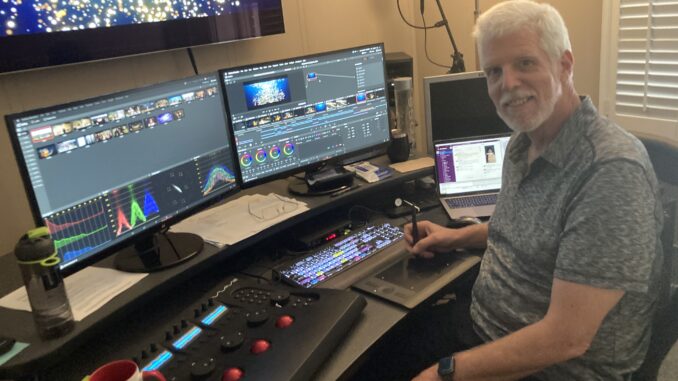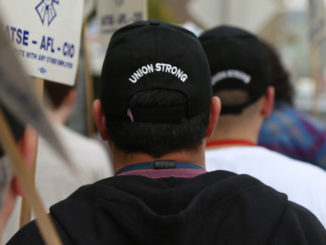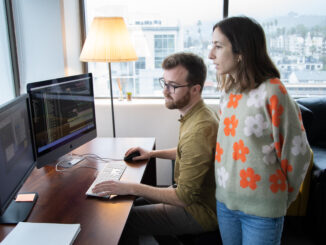
Where are you currently employed?
Stampede Post Production, Hollywood, Calif.
Current projects?
Trailers and commercials for theatrical, broadcast, and social media distribution for numerous studios, including Amazon Prime and Lionsgate.
Describe your job.
After receiving the turnover from the offline creatives, I conform the final sequence from feature footage and clips, perform a color grade and add necessary graphics. Once our audio mixer finishes a proposed mix, these are married and sent to the studio representatives for approval. Once approved, distribution files are created with various release versions (release date, “In Select Theatres”, “Now Streaming”, with or without continuous logos, etc.), and each are converted into various social media aspect ratios. One original sequence can result in dozens of distribution files.
How did you first become interested in this line of work?
In high school, we had a student-produced TV news show that was broadcast to the school during homeroom each week. Students performed all aspects of news production: shooting, reporting, editing, anchoring. The part that was always the most enjoyable for me was the editing, even on the primitive equipment available at the time. It was at that point that I learned that I love collaborative creation through the art and craft of editing.
Who gave you your first break?
I used connections made through my time at USC. Through working as a student at the Interactive Television Network in the School of Engineering and as a student in the School of Cinema, I created relationships with co-workers, fellow students, staff, and faculty. After working at USC for a number of years after graduation, I was able to use these relationships to help me be “in the right place at the right time” to establish myself in the industry. Rik Breniser, a co-worker at the time, helped me get my first job. From there, each job change became an opportunity to grow into new technology and different aspects of editing. Every job I have held in this industry has been the result of networking with my connections made through the years.
What was your first union job?
My first job in “The Industry” was as a union videotape operator at Consolidated Films, Inc. (CFI), but that only lasted a few months before I started as a videotape operator/supervisor at VidCom Post, a non-union facility. In my next job, at 525 Post, I was able to transition to working as an online editor, finishing music videos and commercials. That work transitioned to movie trailers and then to Digital Intermediate conform.
What credits or projects are you proudest of, and why?
The credit I am most proud of is “The Hurt Locker,” which won Best Picture in 2010; I received credit as Online DI Editor and as Visual Effects Artist, finishing over 70 visual effects shots. In the execution of the feature, I was called on to add muzzle flashes, explosions, debris, remove crew and bystanders, and in some cases, help re-envision the look of some scenes. I also lead the team that augmented the explosion near the beginning of the movie, to make sure it was convincingly lethal. Through all of this, I was able to approach the work with confidence in my craft and the tools at hand, so that most of the shots were approved on first presentation to the director.
What was the most fun you’ve had at work?
The credits that were the most fun were those at my previous (union) job at Level 3 Post. I worked as Online Editor for the first seasons of “Ted Lasso” and “The Flight Attendant.” Second to that were the Marvel TV shows for Netflix (“Daredevil,” Jessica Jones,” etc.). In every case, I have the most fun when everyone works together providing their own contribution to the final product. The job of creation is best accomplished when it is the work of a team of collaborators.
Jobwise, what do you hope to be doing five years from now?
Contemplating plans for a comfortable retirement.
What are your outside activities, hobbies, passions?
I love creating, whether that is model railroading, woodworking or home renovation. I also love the satisfaction and meaning that comes from volunteering.
Favorite movie(s)? Why?
Most of the movies I have worked on have been lasting favorites, especially those that have a meaningful message that helps improve society, like “The Hurt Locker” and “Dreamgirls.”
Favorite TV program(s)? Why?
I have always been a fan of the “Star Trek” TV series, all versions. The optimism for humanity that is portrayed strikes a chord with me.
Do you have an industry mentor?
I have always looked up to Steve Scott as a model for my work. We worked together at 525 Post, mostly doing high-end commercials. One such commercial, for Mercedes, won the Clio for Best Visual Effects. Steve’s work ethic has always been to strive for perfection and to never let compromise affect the final product (or at least as little as possible). He has a keen eye for color and composition which has helped him become one the top colorists in the world. He also has an eye for imperfections, sometimes down to the pixel, that, if left, would diminish the final product.
What advice would you offer to someone interested in pursuing your line of work?
Every job I have had in this industry has come about through the assistance of people I have met and formed relationships with over the years. My advice to anyone looking to thrive in this industry is to create close relationships with everyone you come in contact with. You never know who will be the person that provides the lead to “being in the right place at the right time.” I would also advise to always remain humble and willing to help others. Very rarely is arrogance and narcissism beneficial.
Was there ever a circumstance when you had to rely on the Guild for help or assistance?
Not yet.
Is there anything you’d like to say to your fellow Guild members, some words of encouragement?
I learned a very important lesson during my first full-time job in this industry from an editor named Marcus Weiss. He was working freelance, filling in for a vacationing staff editor, while I was supervising the videotape room. The relatively new tape op working with Marcus had just been yelled at by one of the staff editors for not being fast enough at her job. And as luck would have it, the work demands reached her limit and the editor was left waiting for her to complete a series of tasks. Marcus came into the tape room, and the tape op cringed for the yelling that was sure to come. Instead, Marcus said he was there to help and could teach her to be more effective at her job. At the end of the day, Marcus came back to the machine room to thank her for all her hard work. She was amazed at his grace and said so. This was Marcus’s response, which has stayed with me: “This is a small town and we are sure to work together in the future. If I can do something now that will help you be better now, you’ll be that much better when we meet again.” I find it encouraging that there are Marcuses out there, and I strive to be one myself. Maybe you’re one of them—or could be.
Compiled by David Bruskin.





